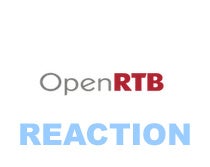 AdExchanger.com asked several executives from advertising technology companies about their reaction to the OpenRTB standard being developed by DataXu, Turn, MediaMath, AdMeld, PubMatic and Rubicon Project as reported by Ad Age last Friday and further clarified by DataXu CTO Bill Simmons here on AdExchanger.com. Also, today, the OpenRTB group put out a press release here. And, DataXu offers a blog post.
AdExchanger.com asked several executives from advertising technology companies about their reaction to the OpenRTB standard being developed by DataXu, Turn, MediaMath, AdMeld, PubMatic and Rubicon Project as reported by Ad Age last Friday and further clarified by DataXu CTO Bill Simmons here on AdExchanger.com. Also, today, the OpenRTB group put out a press release here. And, DataXu offers a blog post.
Click below to read industry views:
- Yoav Arnstein, CEO, Legolas Media
- JT Batson, President, DDS Digital, Donovan Data Systems
- Gurbaksh Chahal, CEO, RadiumOne
- Rob Leathern, CEO, XA.net
- Frost Prioleau, CEO, Simpli.fi
- Tod Sacerdoti, CEO, BrightRoll
Yoav Arnstein, CEO, Legolas Media
Most standardization efforts – the exception are ones that hinder innovation – are welcome. Looking at the project scope description, it definitely seems that the parties are trying to address some challenges that will help grow the audience buying ecosystem. As such, I get the feeling this will start a very healthy process that will be broadly adopted. One wonders, though, why the project is not managed or at least sponsored by the IAB. It would have also eliminated the chatter about some of the players missing from the participating list.
JT Batson, President, DDS Digital, Donovan Data Systems
The fact that vendors got together to solve this problem — that’s a great sign for the ecosystem.
Standards drive transaction costs out of all different media types over the years and along with it an increase in advertiser spend. Cable network buying is the best recent example of a “new” medium that saw a healthy bump in spending following an initial set of standards. There were plenty of people watching cable; it was just too hard to buy.
Digital display is in a somewhat similar state now (mainly too complicated and expensive to transact for both sides). RTB certainly won’t solve all problems, but the OpenRTB initiative seems to increase the chances that the many benefits of RTB become a reality at great scale.
Gurbaksh Chahal, CEO, RadiumOne
OpenRTB is a way to standardize process for pubs/advertisers to use DSPs for RTB. Currently, each entity has their unique sets of requirements…ie: way of excluding/including sites or advertisers, naming creatives, defining inappropriate supply as well as demand, etc. To win the general support of the publishers and advertisers to adopt the RTB way of buying/selling media, it is important to make the usage of this mode pain-free. Currently, RTB not only violates pubs of their premium CPMs, but also threatens to bypass their Class 1 (direct sales’) efforts…since RTB allows double-dipping. Hence, premium pubs have stayed arms length from the DSPs and exchanges and won’t even lend an ear to hear a word about RTB.
From the initial overview, this was going to be put forth by someone regardless; I was thinking IAB would step in eventually and create standardization…after all the networks/sites/advertisers pay hefty fees for them to lay down the basic terms. It seems like a PR play by the DSPs, and if this ever becomes mainstream it will need to be governed by the IAB and will need a hefty say from the actual exchange houses.
Rob Leathern, CEO, XA.net
Seems like a logical step actually. We’ve been working with all the RTB platforms and there’s a lot of inefficiency involved in managing site lists and creative restrictions, not to mention different implementation styles of RTB (though that’s not yet addressed in this – it’s just about creative and advertiser names). Working together in these ways will create efficiencies, but also will inevitably commoditize the buy-side RTB service offerings somewhat in the long run. In the short-run, though, they are likely to get more publishers to participate and create stronger competition for impressions which is good for everyone.
Hopefully it’s not another worthless standards dalliance: anyone remember the ridiculous Liberty Alliance – MS Passport nonsense from 10 years ago?
The irony that the URL they mention (http://www.OpenRTB.info) redirects to code hosted on google code is funny too:
Frost Prioleau, CEO, Simpli.fi
Standardization of the RTB APIs would be a good thing. Issues mentioned like publisher block lists are ripe for standardization, as today we need to manage separate processes across all the different SSPs and Exchanges with whom we are integrated.
Key is that any standards allow for don’t limit capabilities to a “least common denominator” set of functions, as that could stifle innovation. From the interview that you linked, it sounds like the plan is to allow for capabilities above and beyond the standards.
If a RTB standard brings more volume, both on the sell and the buy side, that is definitely a positive.
Tod Sacerdoti, CEO, BrightRoll
Overall, three threads come to mind on this topic:
- Many of us are spending significant time building out programmatic buying and selling capabilities and there are few, if any, standards. OpenRTB will make this process much easier over time and I think is a win for anyone in the programmatic buying / selling arena.
- This is clearly an effort to make sure the standard isn’t “what Google does.” This is essentially the unofficial standard today and Google usually acts in a way that benefits them in the long run. This is essentially an standard for sources other than AdX as well.
- This type of standardization really should be driven by the IAB, but it is clear that the players involved believe this is too important to not develop this quickly outside of the IAB.
By John Ebbert










